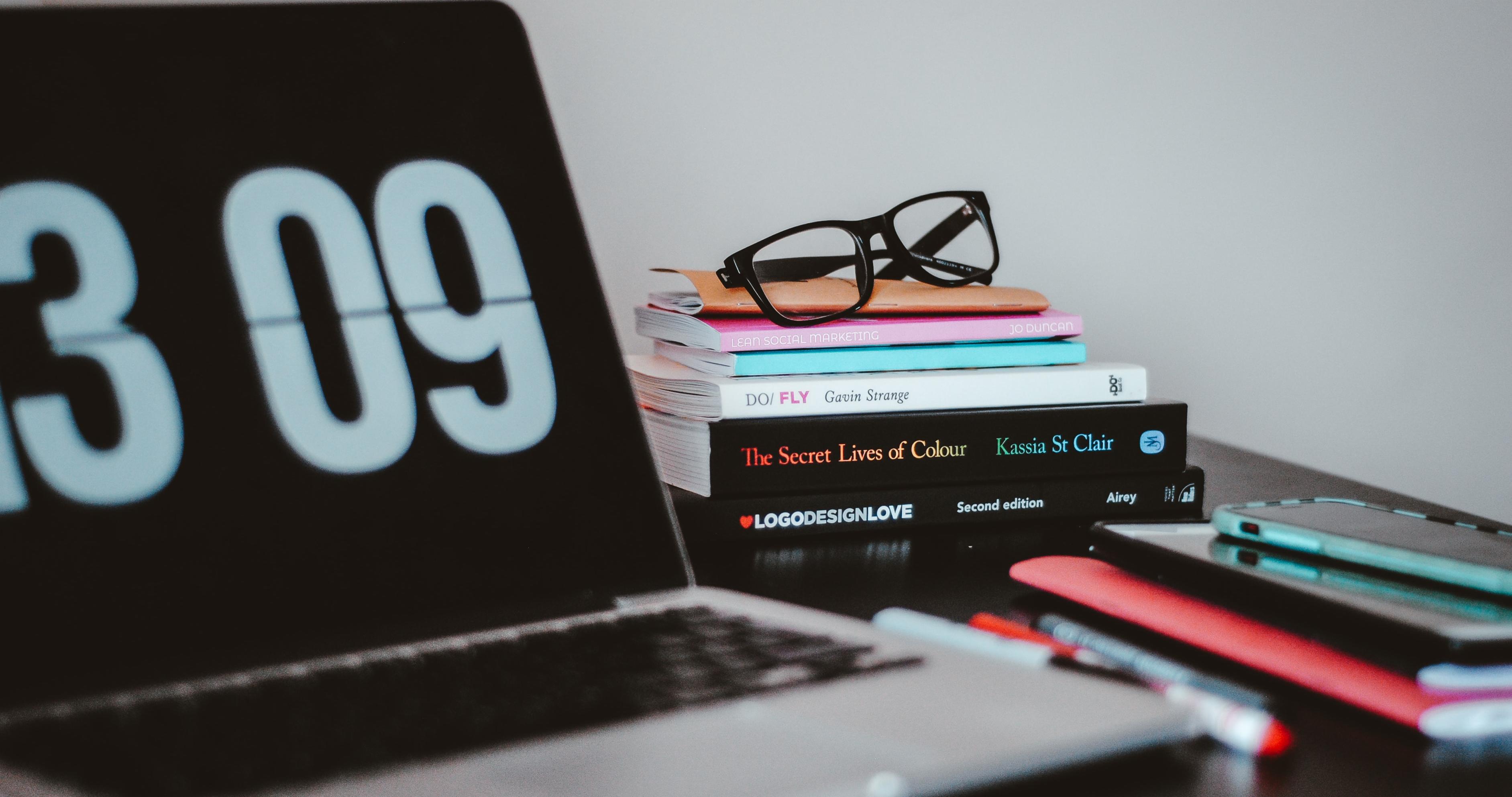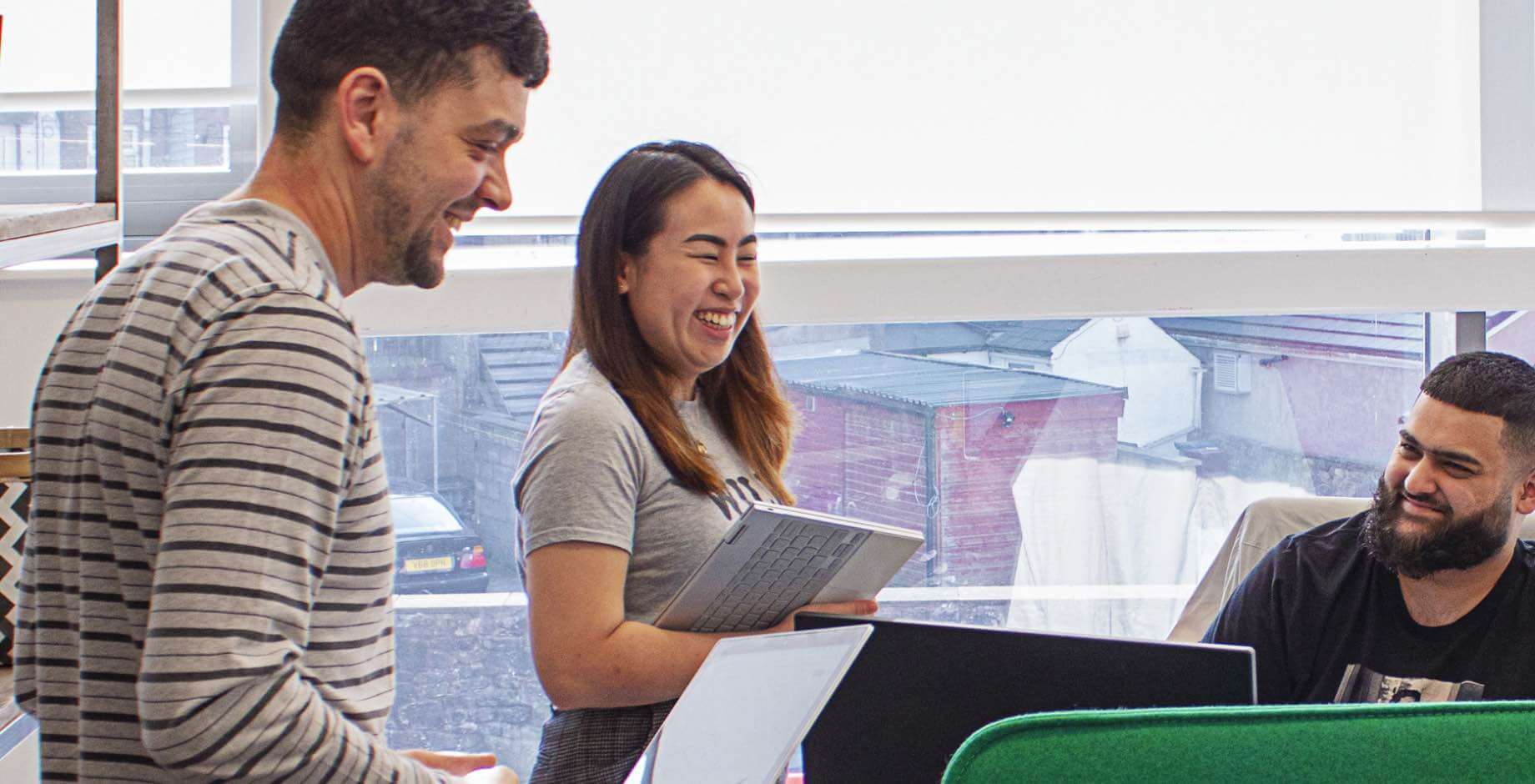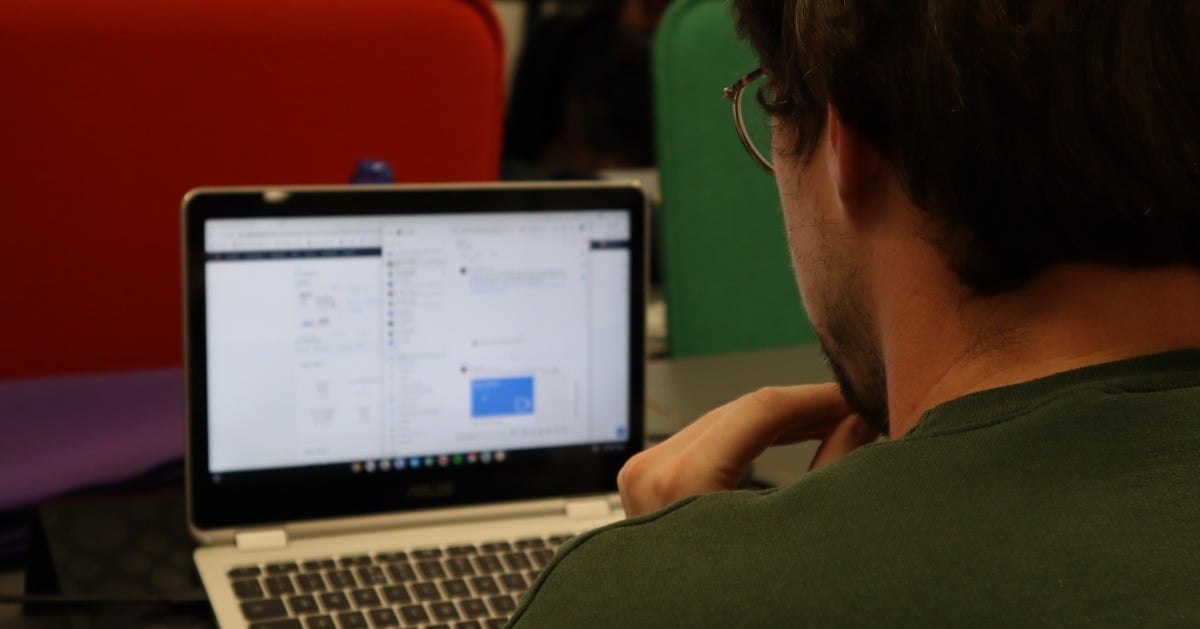“Work from home if you can.” This was the advice from the Prime Minister around two weeks ago....
As I type, it's breakfast time on a Wednesday. This is one of the days of the week that my son and wife are at home, both having a day off from nursery and work. It's 8.30am and working conditions aren't exactly ideal.
Whilst a joiner has arrived to carry on fitting some doors upstairs, downstairs we've had multiple tantrums over which bit of poached egg to put on the fork, spilled beans flicked off the end of a spoon and things only being calmed down (for a few minutes) with the arrival of a banana from the kitchen.
But less about my own eating habits and more getting to the point. Right now, we're in the midst of our first days as a WFH company.
So, this is new.
Something new to Digital 22 as our whole processes and ways of working with each other are designed to be done face to face. It's why we have such a big office with flexible seating and different places to work within it, together.
Thankfully, everything we do is on tools which are all cloud based. That means that we can practically carry on with business as usual as much as possible. But more than a few people have already mentioned that they're finding it odd to be working remotely and being physically alone for hours on end.
Having done plenty of working from home in the past, I thought I'd share some learnings, tips and what-to-expect's. Hopefully they'll help. If you've got any more tips, tricks or ideas, or even good resources, do share them.
Firstly, some disclaimers (for want of a better word).
This whole scenario has come about for a very serious reason. Stay up to date with the latest government advice and recommendations via reputable news sources such as BBC News. Any ideas about getting fresh air etc. I might mention, could well be out of date by the time you read this. Just use sensible judgement.
Remember to also follow normal HR procedures, even though we aren't in the office: Your health is the main concern. And, if you think you might have it, head to this NHS page.
Lastly, if you're unsure on how to operate when working from home, what the expectations are and so on, check out the document called 'Homeworking Charter' on the Shared Drive. This blog does not replace that, it's just a blog which is trying to help.
Oh, and if you've any challenges, check the snagging list for answers and update it if you've got something new to contribute. It's called 'Home Working Snagging List, Support and Q&A' and is also on the Shared Drive.
Right, the tips and that...
Phase 1: The exciting, GSD phase.
No commute, your own music, biscuits on demand.
For many of us who are a bit introverted, it's all exciting at this point. Granted, the country might imminently go into lockdown and we might be literally housebound, but right now, things are good. You're cracking on and getting plenty of shit done.
One thing to watch for when you're in this phase is over-working. Towards the end of the day, you can tell yourself, 'I'll just finish this one off,' as much as you like but time can sneakily creep on.
This feels good in the moment, but will eventually lead to overworking. And bring forward the onset of Phase 2.
Some tips for when the going is good:
- Enjoy it! Feeling productive and flying through work feels brilliant. Good on you, simple as that!
- Be conscious of over delivering or getting perfectionitis, however. Time could run away with you and before you know it, you don't have time to touch other things that you said you'd get done that day. You could end up working longer and harder... not smarter.
- Know when enough's enough. You might be on a roll now but still need to wind down, switch off and come back refreshed for another day of productivity tomorrow. Even you, you beast.
- Update Accelo!
- Be mindful that other people might be on a different vibe, the last thing you want is to put unrealistic expectations on others to match your pace and output.
- But, also, make hay whilst the sun shines! There will be times you're concentration is low, the kids are screaming, the server won't work... whatever. So, if you're on a roll? Make the most of it.
Phase 2: The feeling disconnected phase.
You may well have jumped to this phase first, but even if you haven't got there yet, be conscious that it may well arrive at some point. It certainly did for me.
The best thing, in my view, about our office environment is being able to turn to the people next to you and have a quick chat. It could be about work and to spark some creative ideas, or it could just be to give your brain a break and chat about something daft for a couple of minutes.
Working from home can leave you trying to do this with the dog or the plants on the windowsill. I remember once going to the corner shop for a chocolate bar, even though we had some in the house, just so I could do something different and speak to someone.
- Have as many conversations throughout the day as you would in the office. Reach out on Slack or WhatsApp someone, maybe arrange a video-lunch or a make phonecall whilst stretching your legs outside during your dinner break.
- Make plans for after work which involve interacting with other people. Facetime and video calling friends, socialising with those you live with or visiting other places or people (as long as it's safe and legally allowed - don't want anyone getting in trouble). At the moment, we aren't in full lockdown, it's about only making necessary interactions and visits. Personally, I need to visit people who I'm able to and get outside with the dog. I'd go mad otherwise. Getting out the house is necessary for my own mental health (and probably Charlotte's too!). Until told otherwise, I'll be doing this, albeit sensibly and safely.
- If what you're working on allows the brain space and it works for you, try having the radio on or some background TV. For me, this doesn't help my overall concentration, but when doing admin work or something with little thought involved, whilst working at home, it's a good way of feeling more connected. A few people have mentioned avoiding the news itself, as all that does is cause stress.
- Likewise, whilst doing low-process-level work like that, why not have a video call going with someone? You can always dip out when you need to focus more intently. Just like being physically in the office.
- Lastly, for this phase, if you're feeling a bit lost and disconnected: just reach out. Honestly. Between us, we're all only a Slack or WhatsApp message away.
Once the initial novelty and energy wears off, even the most introverted amongst us will be craving some interaction. Then, after floating around Phase 2 for a bit, maybe getting back into Phase 1 mode now and then, there will be times where it's all too tempting to just finish that episode on Netflix whilst eating your dinner. Or keeping the telly on for the afternoon because, you know, it's important to stay connected to the wider world, isn't it?
You can always just work a bit longer after 5pm, right?
Phase 3: The struggling to stay engaged phase.
The trouble is, I find that the same things that help keep you sane can actually become a massive distraction. Sometimes this has been the biggest challenge I've had when working from home in previous roles, because it's so easy to fall into the trap of "I'll work later because I've no commute' and so-on.
Before I knew it, I hadn't got dressed by the time Charlotte was home and saying 'Hello' was the first time I'd spoken aloud since she left at 8am. That would have felt fine if I'd cracked through everything I had planned, but I hadn't.
I'd succumbed to procrastination. I was over-planning things way beyond what was needed, tidying my work area and even the whole house. Getting house chores done and out the way felt like I was clearing my mind to work better.
I could always make time up later.
But then I just felt rubbish because I knew I was kidding myself. Plus, I'd pissed other people off because I then had to cancel weekend plans to do the work I should have done during normal hours on Friday.
Here's how I beat this one and what a few other people have suggested works for them:
- Commit yourself to daily deadlines with your colleagues, in the morning. The scrum is the perfect time to do this. Saying it aloud to other people gives you something to stick to. Nobody feels good not doing what they said they would and this can be the perfect motivator when your attention's wandering during the day.
- Keep your to-do list realistic, manageable and achievable. Actually sticking to your plan is motivating. Not hitting everything on your list isn't. So, avoid piling loads on there for the day ahead. The simplest way I've found of doing this is giving time allocations to everything on the list and flat out refusing to add anything extra to the list. You can swap and replace items, of course, but when you're in a low concentration phase of WFH, you can become what my grandma calls 'a busy fool' and do little bits of lots of stuff, without actually finishing anything.
- A big lesson I learned was to avoid playing music with lyrics and sticking only to instrumentals. Even if I thought I wasn't listening to the music that much, at best it was taking the edge off my focus (I'd even find myself subconsciously slipping song lyrics into my writing), and at worst I was just finding myself finding more absolute tunes like the one that just came on.
- Another simple thing which makes a big difference, for me anyway, is getting dressed and ready for work just the same as if you're heading to the office. At most, I might wear trackie bottoms because they're comfortable, but everything else I keep the same. Deffo no working in my pyjamas or chilling-on-the-settee clothes - it just puts me in the wrong mindset.
- And stick to your normal hours and routine, not just outfit choices. I'd find myself writing features or marking essays at 11pm because I'd been sneaking in another game of FIFA, 10 minutes after my lunch break should have already finished. As a minimum, follow the Homeworking Charter shared by Rikki, and as a fail-safe, ask yourself, 'Would I be working this way if we were all in the office?'
- Exercise, move around and stay hydrated. Plus, make sure you working set up is good for you. Keep the blood flowing with regular short bouts of exercise (rumour has it, many of your Digital 22 colleagues are doing squats on the hour and going for a run at dinner time), move around to give your brain and eyes a refresh and drink plenty of water to keep you in optimal state. Making sure your desk is set up as correctly as possible - screen at the right level, sat at the best angle and the best height - will stop you doing any physical damage to your neck, shoulders and back.
- Lastly, it's important, at a high level, to keep work as work and home as home. Otherwise, it can all blend in to one. If you're fortunate enough to have a home-office, you'll understand the psychological power of being able to step in and out of your work area. If you're like me and don't have that luxury, create as dedicated a work space as possible and try to only use it for that. This should help you enter work mode when needed - and then be able to switch off when the day is done.
If you've got any tips or tricks yourself, get them shared on Slack. Stay healthy and stay sane. It will all be back to normal soon. :)
Reg



